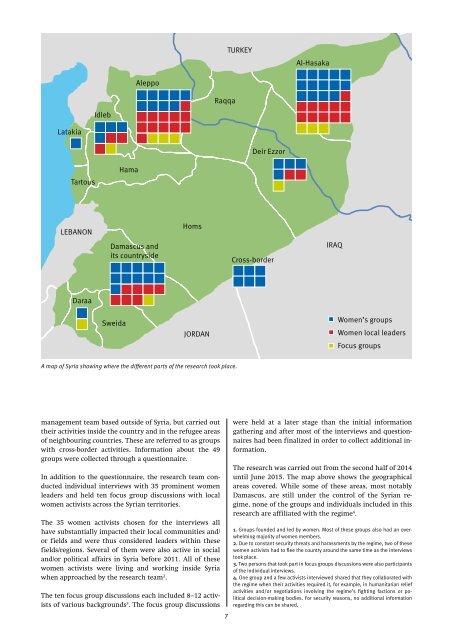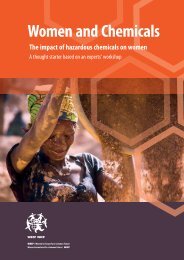future now”
YAO19
YAO19
Create successful ePaper yourself
Turn your PDF publications into a flip-book with our unique Google optimized e-Paper software.
TURKEY<br />
Al-Hasaka<br />
Aleppo<br />
Raqqa<br />
Idleb<br />
Latakia<br />
Deir Ezzor<br />
Tartous<br />
Hama<br />
LEBANON<br />
Damascus and<br />
its countryside<br />
Homs<br />
Cross-border<br />
IRAQ<br />
Daraa<br />
Sweida<br />
JORDAN<br />
Women’s groups<br />
Women local leaders<br />
Focus groups<br />
A map of Syria showing where the different parts of the research took place.<br />
management team based outside of Syria, but carried out<br />
their activities inside the country and in the refugee areas<br />
of neighbouring countries. These are referred to as groups<br />
with cross-border activities. Information about the 49<br />
groups were collected through a questionnaire.<br />
In addition to the questionnaire, the research team conducted<br />
individual interviews with 35 prominent women<br />
leaders and held ten focus group discussions with local<br />
women activists across the Syrian territories.<br />
The 35 women activists chosen for the interviews all<br />
have substantially impacted their local communities and/<br />
or fields and were thus considered leaders within these<br />
fields/regions. Several of them were also active in social<br />
and/or political affairs in Syria before 2011. All of these<br />
women activists were living and working inside Syria<br />
when approached by the research team 2 .<br />
The ten focus group discussions each included 8–12 activists<br />
of various backgrounds 3 . The focus group discussions<br />
7<br />
were held at a later stage than the initial information<br />
gathering and after most of the interviews and questionnaires<br />
had been finalized in order to collect additional information.<br />
The research was carried out from the second half of 2014<br />
until June 2015. The map above shows the geographical<br />
areas covered. While some of these areas, most notably<br />
Damascus, are still under the control of the Syrian regime,<br />
none of the groups and individuals included in this<br />
research are affiliated with the regime 4 .<br />
1. Groups founded and led by women. Most of these groups also had an overwhelming<br />
majority of women members.<br />
2. Due to constant security threats and harassments by the regime, two of these<br />
women activists had to flee the country around the same time as the interviews<br />
took place.<br />
3. Two persons that took part in focus groups discussions were also participants<br />
of the individual interviews.<br />
4. One group and a few activists interviewed shared that they collaborated with<br />
the regime when their activities required it, for example, in humanitarian relief<br />
activities and/or negotiations involving the regime’s fighting factions or political<br />
decision-making bodies. For security reasons, no additional information<br />
regarding this can be shared.



